A group of marine businesses has begun work on a two-year project to retrofit a research and survey vessel with a hydrogen-based propulsion system.
Family-owned O.S. Energy (UK) is leading the project to demonstrate the use of compressed hydrogen as a zero-emission fuel on the RV Prince Madog, a ship it co-owns with Bangor University.
The retrofit will be a world first at this scale and will involve integrating the new hydrogen storage, fuel cell and battery system with the existing drive train. The technology will be tested during a one-month demonstration period, then used to deliver daily teaching cruises to marine sciences students for a further four weeks.
Global net zero potential
Managing Director, Martin Nuernberg, said:
We’ll be enabling the Prince Madog to decarbonise its research and teaching activities. This project has global potential and will really strengthen the UK’s position in the maritime industry’s drive to net zero.
At the same time, we’ll be installing an innovative new nature-inspired propeller design which is shaped like the fins of a humpback whale. We expect this to improve efficiency, reduce noise and help us save even more energy so that we can go further on less fuel.
About the funding
The TransShip II-RV Prince Madog hydrogen retrofit project is part of the Clean Maritime Demonstration Competition round three (CMDC3). CMDC3 has allocated £60 million to 19 projects from across the UK to deliver real world demonstration projects in clean maritime solutions between April 2023 to March 2025.
CMDC is funded by the Department for Transport as part of the UK Shipping Office for Reducing Emissions programme and is being delivered in partnership with Innovate UK.
Driving meaningful change in the industry
O.S. Energy (UK) is partnering with Newcastle and Exeter universities, along with:
- naval architects Newcastle Marine Services and Chartwell Marine
- marine engineers Solis Marine
- decarbonisation support providers, Cedar Marine
- ship propulsion experts, Stone Marine Propulsion
- hydrogen specialists H2Tec
O.S. Energy (UK) and several of its partners have also taken part in previous CMDC funding rounds.
Martin said:
The whole CMDC programme has been extremely helpful in changing the attitude of the maritime industry. It has brought together academics and industry and enabled us to collaborate with other companies who also want to achieve something meaningful.
Getting practical funding support from the government has given us a great kick-start. It has enabled us to deliver something very innovative which we can develop into something on an even greater scale in the future.
Top image: The hydrogen retrofit will take place on the RV Prince Madog, a research and survey vessel owned by O.S. Energy and Bangor University. Credit: O.S. Energy

